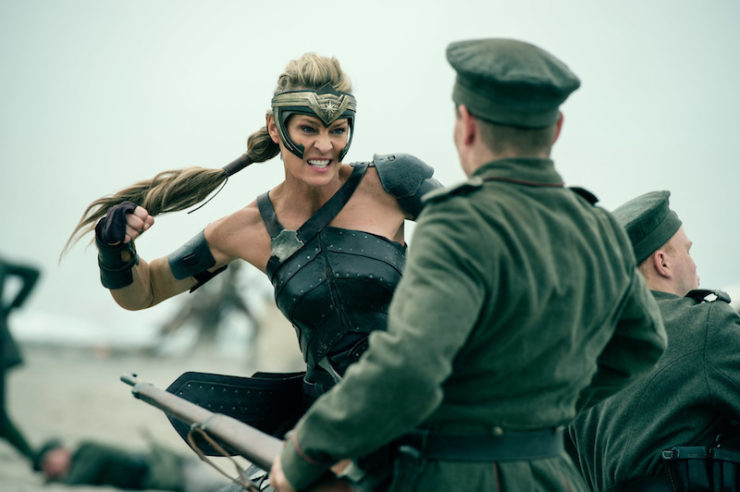Imagine you star in a movie that is widely considered to be one of the greatest fantasy films of all time. The movie has your name in the title. You are the character whom the whole story revolves around, a story told to a sick little boy in need of a distraction as he lays in bed, home from school. You are the two most important things for a fictional woman to be according to societal standards: beautiful and marriageable.
And you’re also a princess, because that’s how these stories always work.
Spoilers ahead for the Wonder Woman film.
Those who know the secrets of William Goldman’s The Princess Bride know that he started writing the story for his daughters, one who wanted a story about a bride and the other who wanted a story about a princess. He merged those concepts and wound up with a tale that didn’t focus overmuch on his princess bride, instead bound up in the adventures of a farmboy-turned-pirate, a master swordsman in need of revenge, a giant with a heart of gold, and a war-hungry Prince looking for an excuse to start a terrible conflict. It was turned into a delightful movie directed by Rob Reiner in 1987.
The princess bride in question was played by a twenty-year-old Robin Wright.
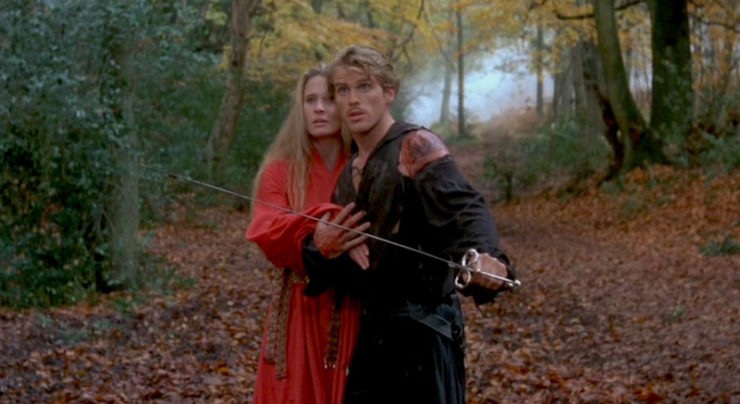
She was as masterful in the role as the script permitted, a haughty young woman who doesn’t trust enough in love and then, once proved wrong on that front, never doubts its power again. She tells off the powerful prince, she waits for her beloved Westley, she jumps into Fezzik’s arms and rides off with her rescuers. She is every inch the romantic heroine that she must be. But Princess Buttercup’s story is not her own. It is Inigo Montoya’s, it is Fezzik’s, it is Miracle Max’s. It is the story of Prince Humperdink’s defeat and Count Rugen’s much-deserved comeuppance. It is the story of Westley and Buttercup’s love, but even that story is more concerned with all that Westley was willing to go through in order to will their happy ending into being.
Still, this princess bride mattered to many, and does to this day. Buttercup alongside Westley is a symbol of love so potent that even cynics are not immune to their charms. Her poise and fierceness are captivating, even as the film spends its emotional coin on the pit of despair and Inigo’s love of his long-dead father. And Robin Wright has led a stunning career, full of complicated and sometimes frightening roles. Most of them appear in serious dramas, riddled with complex intersections of human lives and politics. Nothing of The Princess Bride’s specific make and model (aside from a queen in a very odd retelling of Beowulf).
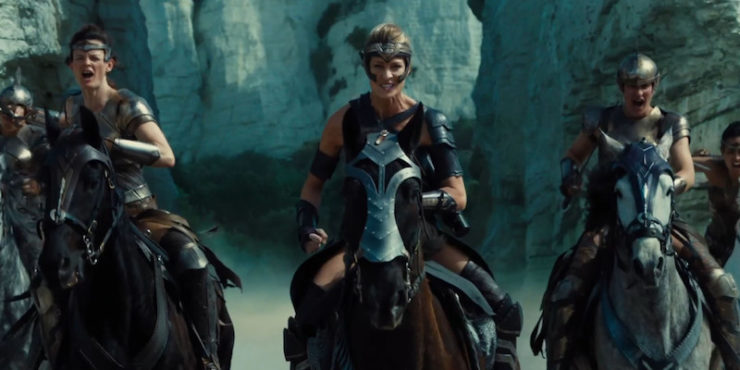
And then Wonder Woman finally found her way to the big screen with her origin intact, and Robin Wright emerged as General Antiope, sister of Queen Hippolyta and aunt to young Diana. In this film, she leads an army, and when her niece is forbidden by her mother to learn their ways of combat, Antiope takes it upon herself to train the girl without the permission of her queen. When they are finally discovered, the general berates the queen for leaving her only child unprepared for the future… and is given permission to continue the training program, despite her disobedience. She spends roughly centuries (millennia?) preparing the princess of Themyscira for her destiny, her calling—to be the greatest warrior the Amazons have ever produced. General Antiope, perhaps more than anyone on that island, shapes Diana into a woman who can inspire hope and empathy in others, who can venture out beyond their shores, who can put an end to world wars.
This casting choice may have been made out of amusement or even in the name of fun, but it doesn’t change the fact that Princess Buttercup is now an Amazon warrior. Princess Buttercup is the queen’s right hand. Princess Buttercup tells her sister that she is wrong to keep Diana from her heritage because she already knows what happens to women who cannot fight for themselves—
—they wind up locked away by a prince who demands their hand in marriage while he simultaneously plots their murder.
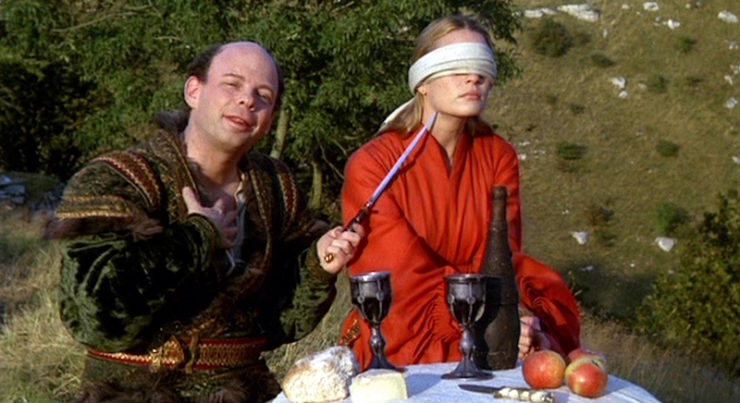
It is impossible to watch Wonder Woman without imagining what ever happened to Buttercup. What she would have survived, endured, and come to stand for as the years went by. And in that imagining, Antiope is the whispered possibility that many of us never dared to dream. What if she had grown in strength and stubbornness and power until she could train one of the greatest warriors of all time? What if Buttercup, who believed so desperately in love, had passed that wisdom on to a young girl who would hold that belief in trust for every person she met? What if that line between a princess bride and Princess Diana is as thin as a page in a storybook?
When we are very young, many of us hope to be loved as Buttercup was loved, or at least to experience some of the adventure she found. But when we are older, when we have a little more life under our belts, many of us look toward greater legacies. We hope to fight for things that matter, to teach others to do more than we could, to be good leaders and good friends. Antiope is Buttercup all grown up, with skills and discipline to match, and all the love and camaraderie she could ever need. This progression seems not just plausible, but essential. It is an epilogue of a different kind.
These women herald from different universes entirely, but this is the metafictional tale that binds them, a beautiful turn that was three decades in the making. We now live in the multiverse where one of the most beloved fairy tale princesses bloomed into the general who showed one of the world’s greatest superheroes how to fight. How to lead. How to spread the strength and compassion of her people to each life she touched. Princess Buttercup’s legacy didn’t end with a kiss, but with a sacrifice for another woman whom she loved more dearly than life. Whatever feats Diana accomplishes will be owed to that sacrifice, that bond, that love. It is little surprise that she turned out to be so spectacular; she had the most knowledgeable mentor conceivable lighting her way.
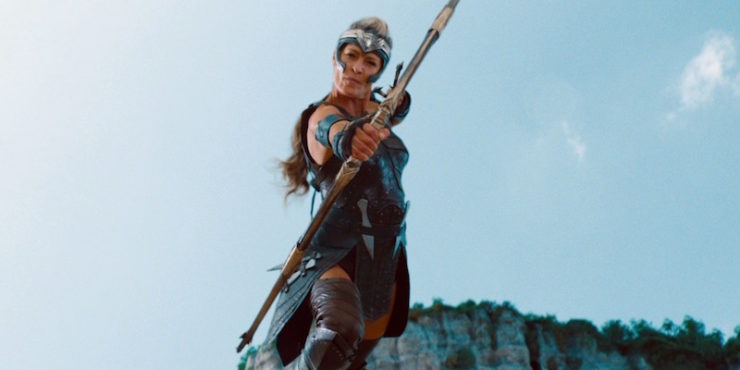
This possible future, this twist in the fabric of reality, is not a version that anyone could have predicted as the years passed. Yet somehow it feels right, or even righteous. Like a particularly beautiful chord progression, or a coat that somehow fits better long after you bought the thing. Of all the outcomes, we somehow received the reality where Buttercup moved on to master archery and serve an Amazon queen and command legions. We learned what life was like after the Fire Swamp, after the sham wedding where you never get the chance to say “I Do”, after the grandfather closes the book on your story because no one ever bothers to write past love’s triumph.
Sometimes you play a small part in a story with your name on it and get your happy ending—and sometimes you go on to play the largest part of all in the creation of a Wonder Woman. The thought that a Buttercup could morph over time into an Antiope is perhaps the greatest comfort of all, in a world where women’s roles are often limited and limiting. Let us be princesses, but let us be generals too. Let us be loved by farmboys, but also by our sisters. Let us live in stories made to heal, but also in stories made to marshal bravery, fortitude, and wisdom.
Let us keep our fairy tales, but live our lives to heights that are nothing short of mythological.
Emmet Asher-Perrin hopes that she’s halfway to living her best Antiope life. You can bug her on Twitter and Tumblr, and read more of her work here and elsewhere.










